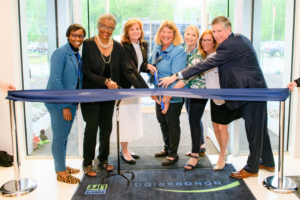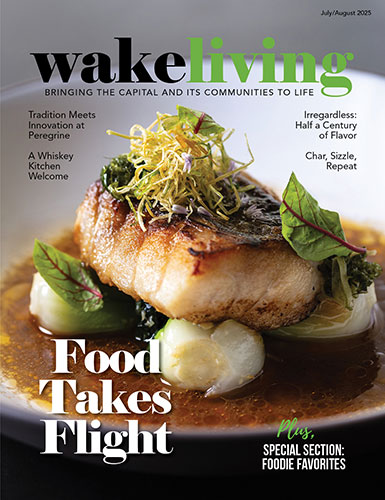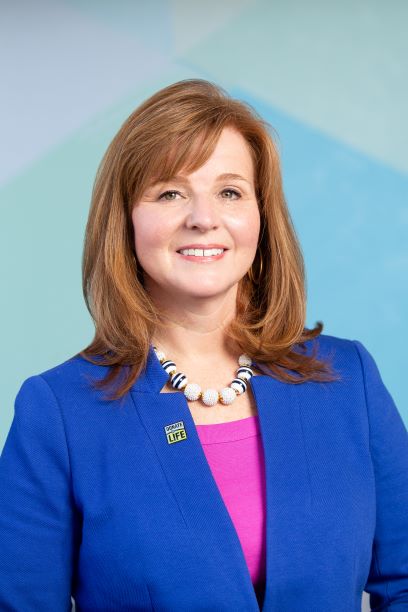April is officially National Donate Life Month, a time to draw attention to the need for and importance of organ, eye, and tissue donation. In the United States, more than 100,000 people are waiting for lifesaving transplants, including more than 3,000 North Carolinians. HonorBridge, North Carolina’s largest Organ Procurement Organization (OPO), acts as a bridge between people who need transplants and the donors who make those transplants possible.
“Organ donation is rare,” said Danielle Bumarch, RN, JD, president and CEO. “While most of the population can be tissue donors at their time of death, less than 1% of deaths are able to result in organ donation. This is why our team works so incredibly hard to save lives and encourage everyone to say ‘yes’ to donation. One organ, eye, and tissue donor can save and heal more than 75 lives.”
Coming off the heels of Women’s History Month, we recently spoke with Bumarch to learn more about the woman behind the scenes of this lifesaving operation. From Air Force nurse to CEO, Bumarch has dedicated the past 25 years of her life to those who wait in hope for the gift of life.
How did you get your start at HonorBridge?
At heart, I’m a nurse. I went to Marquette University in Milwaukee, Wisconsin, and I took care of my first organ donor during my time in the Air Force. Once I was working in the Greensboro area in the hospitals, I would run into the people there doing in-services for an OPO, a job I had wanted to do ever since my experience with organ donation in the Air Force. I applied and applied, but I didn’t hear anything for a long time until I made a connection with someone who used to work there. I had to beat down the door to come here, which is funny because 15 years later they would invite me to become the CEO. I think it worked out pretty well!

Ribbon cutting ceremony for the HonorBridge Donor Care Center in Chapel Hill. Photo by Kate Pope Photography
Tell me about your first experience with organ donation, and how that impacted you both personally and professionally.
I was down in Biloxi, Mississippi, at Keesler Air Force Base working in critical care when somebody had a major stroke while on base. Once the family understood their loved one wasn’t going to survive, they knew that they wanted to be a donor. We called the Mississippi OPO and a coordinator came. They explained everything to the family, worked with us, did all testing, managed the donor all night, and lined up the recipients. When I saw the impact of the work that she did, to see that process up close — it was very complex and nothing short of a miracle. And then to see the impact on the donor’s family and hospital staff was tremendous. When I saw that coordinator job, I knew that’s what I wanted to do when I got out.
What aspects of your job bring you joy or fulfillment?
I just love the mission and the people. My favorite thing about it is it gives you great appreciation for not taking life for granted. At the end of every phone call in the work that we do are families that are really going through a lot of shock and grief, but it’s also such a gift to hear about the donors. The side of humanity that thinks of other people, complete strangers, and is willing to impact their lives and be that hero that they need. This is difficult work. It’s very emotionally heavy, and for some of our team, it’s physically heavy. People don’t really stay in this field, especially in the clinical side, unless they really have a passion for it. To show up to a place where people have such a passion for what they do every day, I just think is incredible.
What is the biggest misconception about organ donation within the community, and how do you address it?
The number-one concern is that people aren’t going to be saved and that organ donation will kind of be rushed to instead of really saving people’s lives. People who work in health care and see the process realize that doesn’t happen at all. Because an organ donor must be on a ventilator, keeping blood and oxygen flowing to their organs, someone cannot be an organ donor unless they were resuscitated and everything was done to try to save their lives. Once it’s been determined that they’re not going to survive, only then can they become an organ donor. I also think we just need to do a lot of listening to the communities who have historical challenges with being mistreated and disadvantaged in health care. We just need to do a lot of listening to what they need to know to build that trust.
What specific achievements or milestones are you particularly proud of?
My vision has been to build the best place that people have ever worked, with strong connections among colleagues, a shared mission, and genuine appreciation. I feel like the new building in Chapel Hill has really helped that come to fruition, because it’s such a great place to welcome people. Not every employee works in that facility, but it’s perfect for hosting meetings with key partners and stakeholders. If you’re someone who likes to have a certain energy around you to feel focused, it’s a great facility for that. So, I’d have to say the magnitude of that project. But at the end of the day, it’s always about saving more lives. And this team has worked hard in finding more ways to save lives.
Finally, in your own words, why would you encourage people to register as organ donors?
It’s the ultimate thing that you can do for humanity. It’s that selfless act. I kind of feel like if you are willing to receive, you should also be willing to give — that kind of generosity makes the whole world go ’round. When someone is experiencing grief over a loss, at that moment they have the power to prevent another family from going through that because of organ failure. What a beautiful blessing it is to pass that on and save someone from that.
In honor of National Donate Life Month, you can register your decision online, via the Health app on your iPhone, or at the DMV. Together, we can make a difference.






